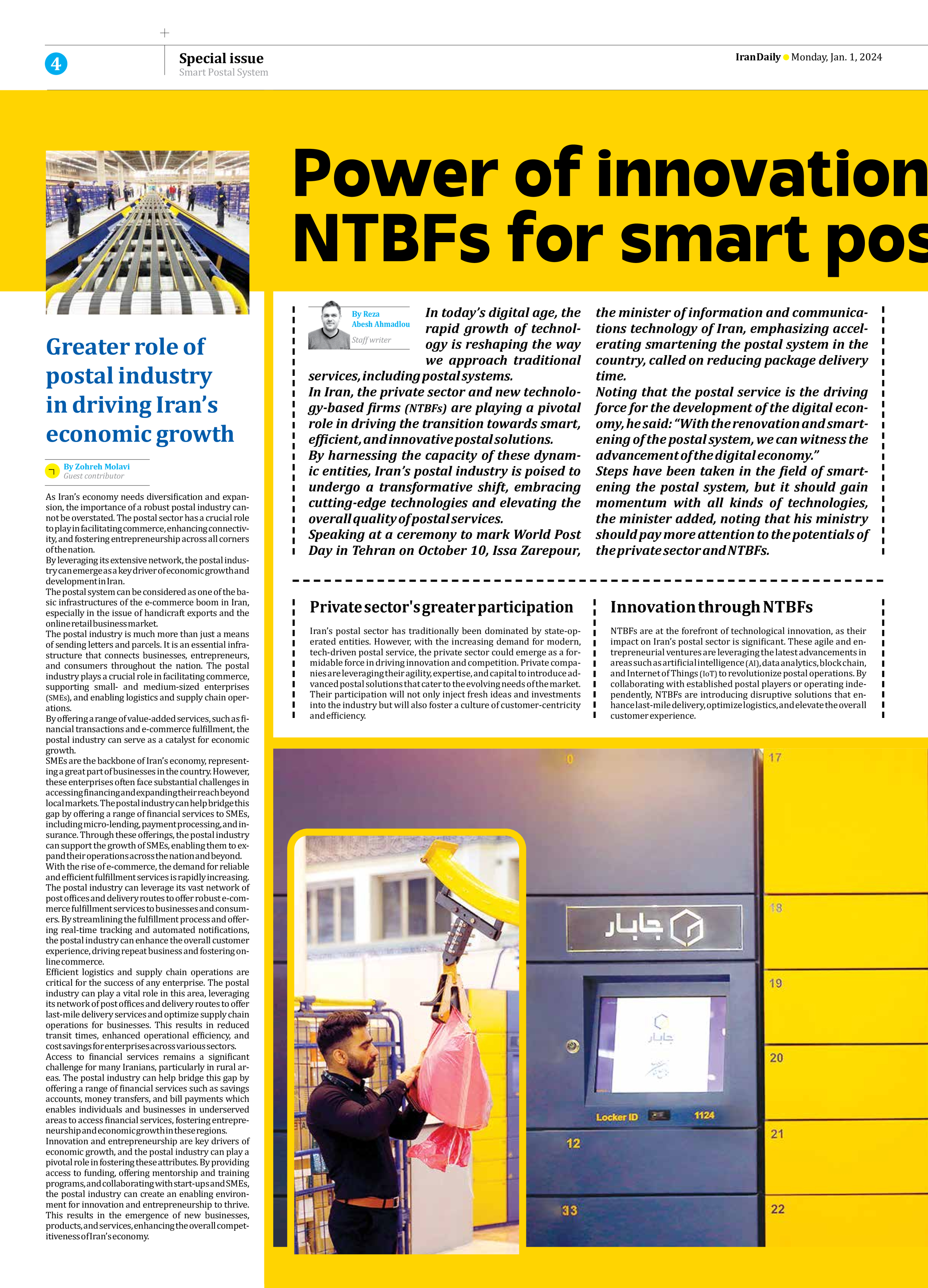
Power of innovation with private sector, NTBFs for smart postal system in Iran
By Reza Abesh Ahmadlou
Staff writer
In today’s digital age, the rapid growth of technology is reshaping the way we approach traditional services, including postal systems.
In Iran, the private sector and new technology-based firms (NTBFs) are playing a pivotal role in driving the transition towards smart, efficient, and innovative postal solutions.
By harnessing the capacity of these dynamic entities, Iran’s postal industry is poised to undergo a transformative shift, embracing cutting-edge technologies and elevating the overall quality of postal services.
Speaking at a ceremony to mark World Post Day in Tehran on October 10, Issa Zarepour, the minister of information and communications technology of Iran, emphasizing accelerating smartening the postal system in the country, called on reducing package delivery time.
Noting that the postal service is the driving force for the development of the digital economy, he said: “With the renovation and smartening of the postal system, we can witness the advancement of the digital economy.”
Steps have been taken in the field of smartening the postal system, but it should gain momentum with all kinds of technologies, the minister added, noting that his ministry should pay more attention to the potentials of the private sector and NTBFs.
Private sector's greater participation
Iran’s postal sector has traditionally been dominated by state-operated entities. However, with the increasing demand for modern, tech-driven postal service, the private sector could emerge as a formidable force in driving innovation and competition. Private companies are leveraging their agility, expertise, and capital to introduce advanced postal solutions that cater to the evolving needs of the market. Their participation will not only inject fresh ideas and investments into the industry but will also foster a culture of customer-centricity and efficiency.
Innovation through NTBFs
NTBFs are at the forefront of technological innovation, as their impact on Iran’s postal sector is significant. These agile and entrepreneurial ventures are leveraging the latest advancements in areas such as artificial intelligence (AI), data analytics, block chain, and Internet of Things (IoT) to revolutionize postal operations. By collaborating with established postal players or operating independently, NTBFs are introducing disruptive solutions that enhance last-mile delivery, optimize logistics, and elevate the overall customer experience.
Key areas of impact
The involvement of the private sector and NTBFs is driving momentum for smartening the postal system across various key areas, transforming the traditional postal landscape into a dynamic and tech-infused domain:
Last-mile delivery optimization
Private companies and NTBFs are deploying predictive analytics, route optimization algorithms, and real-time tracking solutions to streamline last-mile delivery operations. This results in faster, more precise deliveries, reducing transit times and enhancing customer satisfaction.
E-commerce integration
With the booming e-commerce market in Iran, private sector players and NTBFs are collaborating with online retailers and marketplaces to develop seamless integration of postal services into the e-commerce ecosystem. From automated order fulfillment to real-time inventory management, these partnerships are creating a robust infrastructure for efficient e-commerce deliveries.
Customer-centric solutions
Through the utilization of advanced customer relationship management (CRM) systems and personalized communication platforms, private sector entities and NTBFs are redefining the way customers interact with postal services. From proactive delivery notifications to tailored service offerings, the focus should be on delivering a superior and personalized customer experience.
Advanced logistics and warehousing
In the near future, private companies should invest in state-of-the-art logistics and warehousing facilities, incorporating technologies such as radio-frequency identification (RFID) tagging, autonomous vehicles, and warehouse automation to optimize inventory management and order fulfillment processes. This results in enhanced operational efficiency and cost savings.
Regulatory facilitation and support
Recognizing the transformative potential of the private sector and NTBFs in driving smart post momentum, the Iranian government should take proactive steps to facilitate their participation. By fostering an enabling regulatory environment, providing access to funding, and offering support for research and development, authorities will promote an ecosystem where innovation and entrepreneurship can flourish within the postal industry.
Challenges
While the involvement of the private sector and NTBFs presents a wealth of opportunities for a smart postal system in Iran, it also brings forth certain challenges. Issues such as data security, regulatory compliance, and interoperability with existing postal systems need to be addressed.
However, these challenges present avenues for collaboration and innovation, providing an opportunity for stakeholders to work together in shaping the future of a smart postal system in Iran.







